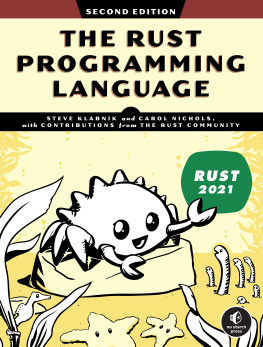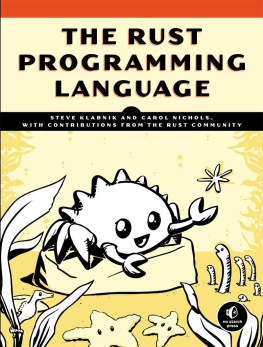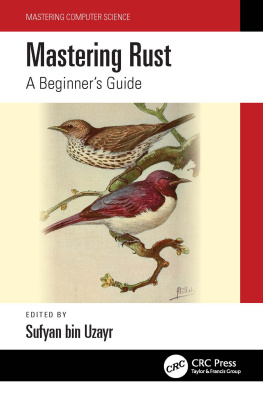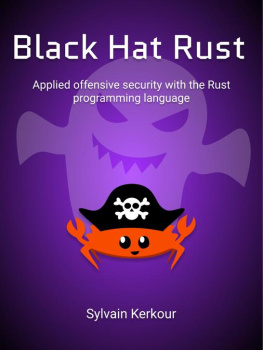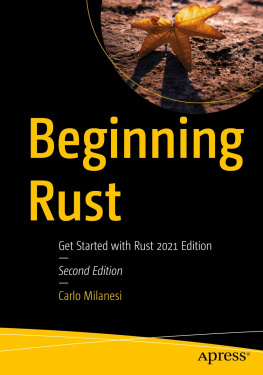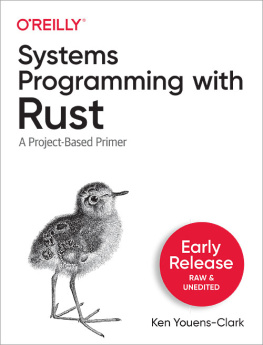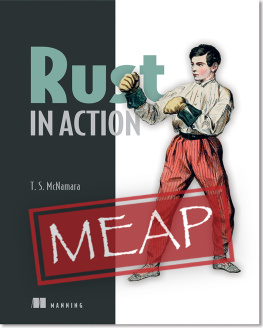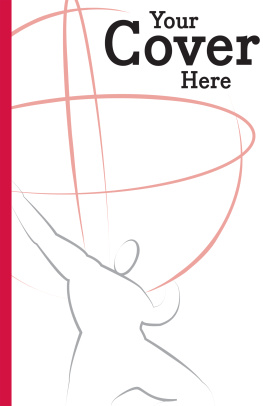Steve Klabnik - The Rust Programming Language, 2nd Edition
Here you can read online Steve Klabnik - The Rust Programming Language, 2nd Edition full text of the book (entire story) in english for free. Download pdf and epub, get meaning, cover and reviews about this ebook. year: 2023, publisher: No Starch Press, genre: Romance novel. Description of the work, (preface) as well as reviews are available. Best literature library LitArk.com created for fans of good reading and offers a wide selection of genres:
Romance novel
Science fiction
Adventure
Detective
Science
History
Home and family
Prose
Art
Politics
Computer
Non-fiction
Religion
Business
Children
Humor
Choose a favorite category and find really read worthwhile books. Enjoy immersion in the world of imagination, feel the emotions of the characters or learn something new for yourself, make an fascinating discovery.
- Book:The Rust Programming Language, 2nd Edition
- Author:
- Publisher:No Starch Press
- Genre:
- Year:2023
- Rating:5 / 5
- Favourites:Add to favourites
- Your mark:
- 100
- 1
- 2
- 3
- 4
- 5
The Rust Programming Language, 2nd Edition: summary, description and annotation
We offer to read an annotation, description, summary or preface (depends on what the author of the book "The Rust Programming Language, 2nd Edition" wrote himself). If you haven't found the necessary information about the book — write in the comments, we will try to find it.
The Rust Programming Language, 2nd Edition — read online for free the complete book (whole text) full work
Below is the text of the book, divided by pages. System saving the place of the last page read, allows you to conveniently read the book "The Rust Programming Language, 2nd Edition" online for free, without having to search again every time where you left off. Put a bookmark, and you can go to the page where you finished reading at any time.
Font size:
Interval:
Bookmark:

2nd Edition
by Steve Klabnik and Carol Nichols, with contributions from the Rust Community

THE RUST PROGRAMMING LANGUAGE, 2ND EDITION. Copyright 2023 by the Rust Foundation and the Rust Project Developers.
All rights reserved. No part of this work may be reproduced or transmitted in any form or by any means, electronic or mechanical, including photocopying, recording, or by any information storage or retrieval system, without the prior written permission of the copyright owner and the publisher.
Printed in the United States of America
First printing
27 26 25 24 23 1 2 3 4 5
ISBN-13: 978-1-7185-0310-6 (print)
ISBN-13: 978-1-7185-0311-3 (ebook)
Publisher: William Pollock
Managing Editor: Jill Franklin
Production Manager: Sabrina Plomitallo-Gonzlez
Production Editors: Jennifer Kepler and Katrina Horlbeck Olsen
Developmental Editor: Liz Chadwick
Cover Illustration: Karen Rustad Tlva
Interior Design: Octopod Studios
Technical Reviewer: JT
Copyeditor: Audrey Doyle
Compositor: Jeff Lytle, Happenstance Type-O-Rama
Proofreader: Liz Wheeler
For information on distribution, bulk sales, corporate sales, or translations, please contact No Starch Press, Inc. directly at info@nostarch.com or:
No Starch Press, Inc.
245 8th Street, San Francisco, CA 94103
phone: 1.415.863.9900
www.nostarch.com
The Library of Congress has catalogued the first edition as follows:
Names: Klabnik, Steve, author. | Nichols, Carol, 1983- eauthor.
Title: The Rust programming language / by Steve Klabnik and Carol Nichols ; with contributions from
the Rust Community.
Description: San Francisco : No Starch Press, Inc., 2018. | Includes index. Identifiers: LCCN
2018014097 (print) | LCCN 2018019844 (ebook) | ISBN 9781593278519 (epub) | ISBN 1593278519 (epub)
| ISBN 9781593278281 (paperback) | ISBN 1593278284 (paperback)
Subjects: LCSH: Rust (Computer programming language) | BISAC: COMPUTERS / Programming / Open Source.
| COMPUTERS / Programming Languages / General. | COMPUTERS / Programming / General.
Classification: LCC QA76.73.R87 (ebook) | LCC QA76.73.R87 K53 2018 (print) | DDC 005.13/3--dc23
LC record available at https://lccn.loc.gov/2018014097
No Starch Press and the No Starch Press logo are registered trademarks of No Starch Press, Inc. Other product and company names mentioned herein may be the trademarks of their respective owners. Rather than use a trademark symbol with every occurrence of a trademarked name, we are using the names only in an editorial fashion and to the benefit of the trademark owner, with no intention of infringement of the trademark.
The information in this book is distributed on an As Is basis, without warranty. While every precaution has been taken in the preparation of this work, neither the authors nor No Starch Press, Inc. shall have any liability to any person or entity with respect to any loss or damage caused or alleged to be caused directly or indirectly by the information contained in it.
Steve Klabnik was the lead for the Rust documentation team and was one of Rusts core developers. A frequent speaker and a prolific open source contributor, he previously worked on projects such as Ruby and Ruby on Rails.
Carol Nichols is a member of the Rust Crates.io Team and a former member of the Rust Core Team. Shes a co-founder of Integer 32, LLC, the worlds first Rust-focused software consultancy. Nichols has also organized the Rust Belt Rust Conference.
JT is a Rust core team member and the co-creator of the Rust error message format, Rust Language Server (RLS), and Nushell. They first started using Rust in 2011, and in 2016 joined Mozilla to work on Rust full-time, helping to shape its direction for widespread use. These days, they are a freelance Rust trainer and advocate for safe systems programming.
It wasnt always so clear, but the Rust programming language is fundamentally about empowerment: no matter what kind of code you are writing now, Rust empowers you to reach further, to program with confidence in a wider variety of domains than you did before.
Take, for example, systems-level work that deals with low-level details of memory management, data representation, and concurrency. Traditionally, this realm of programming is seen as arcane, accessible to only a select few who have devoted the necessary years to learning it to avoid its infamous pitfalls. And even those who practice it do so with caution, lest their code be open to exploits, crashes, or corruption.
Rust breaks down these barriers by eliminating the old pitfalls and providing a friendly, polished set of tools to help you along the way. Programmers who need to dip down into lower-level control can do so with Rust, without taking on the customary risk of crashes or security holes and without having to learn the fine points of a fickle toolchain. Better yet, the language is designed to guide you naturally toward reliable code that is efficient in terms of speed and memory usage.
Programmers who are already working with low-level code can use Rust to raise their ambitions. For example, introducing parallelism in Rust is a relatively low-risk operation: the compiler will catch the classical mistakes for you. And you can tackle more aggressive optimizations in your code with the confidence that you wont accidentally introduce crashes or vulnerabilities.
But Rust isnt limited to low-level systems programming. Its expressive and ergonomic enough to make CLI apps, web servers, and many other kinds of code quite pleasant to writeyoull find simple examples later in the book. Working with Rust allows you to build skills that transfer from one domain to another; you can learn Rust by writing a web app, then apply those same skills to target your Raspberry Pi.
This book fully embraces the potential of Rust to empower its users. Its a friendly and approachable text intended to help you level up not just your knowledge of Rust, but also your reach and confidence as a programmer in general. So dive in, get ready to learnand welcome to the Rust community!
Nicholas Matsakis and Aaron Turon
This version of the text assumes youre using Rust 1.62.0 (released 2022-06-30) or later with edition="2021" in the Cargo.toml file of all projects to configure them to use Rust 2021 edition idioms. See Installation on page 1 for instructions on installing or updating Rust, and see Appendix E for information on editions.
The 2021 edition of the Rust language includes a number of improvements that make Rust more ergonomic and that correct some inconsistencies. On top of a general update to reflect these improvements, this rendition of the book has a number of improvements to address specific feedback:
- Chapter 7 contains a new quick reference section on organizing your code into multiple files with modules.
- Chapter 13 has new and improved closure examples that more clearly illustrate captures, the
movekeyword, and theFntraits. - We fixed a number of small errors and imprecise wording throughout the book. Thank you to the readers who reported them!
Note that any code from earlier renditions of this book that compiled will continue to compile with the relevant edition in the projects
Font size:
Interval:
Bookmark:
Similar books «The Rust Programming Language, 2nd Edition»
Look at similar books to The Rust Programming Language, 2nd Edition. We have selected literature similar in name and meaning in the hope of providing readers with more options to find new, interesting, not yet read works.
Discussion, reviews of the book The Rust Programming Language, 2nd Edition and just readers' own opinions. Leave your comments, write what you think about the work, its meaning or the main characters. Specify what exactly you liked and what you didn't like, and why you think so.

